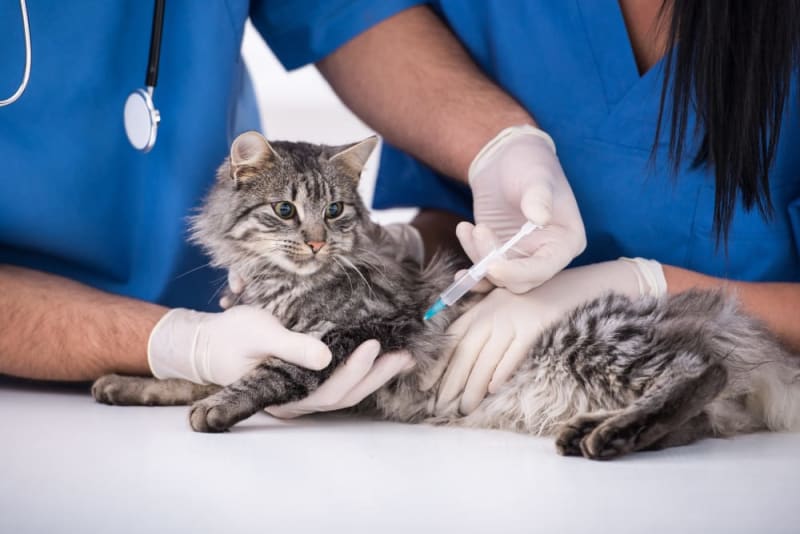-
Rabies Vaccination Requirements for Cats and Dogs in Maine
Law: All cats and dogs over 3 months of age must be vaccinated against rabies. Boosters are required based on guidelines from national health veterinarians. (read full version)
- Explanation:
Title 7: AGRICULTURE AND ANIMALS
Part 9: ANIMAL WELFARE
Chapter 720: RABIES PREVENTION AND SHELTER PROVISIONS
§3916. Rabies VaccinationsRabies Vaccination Requirements for Cats
Maine law mandates that all cats over 3 months old must be vaccinated against rabies unless exempt under specific circumstances (outlined in subsection 4). Licensed veterinarians must administer the rabies vaccination or supervise its administration. Once the cat receives its initial vaccination, it is protected for one year. After that, owners need to ensure a booster shot is administered. Moreover, additional boosters should follow the guidelines recommended by national veterinary authorities, which depend on the type of vaccine used. Rabies vaccinations are critical in controlling this deadly disease, and public health relies on strict adherence to these regulations.
Rabies Vaccination Requirements for Dogs and Wolf Hybrids
Similarly, dogs must be vaccinated against rabies within 30 days of turning 3 months old. A licensed veterinarian must also perform the vaccination, ensuring its efficacy. After the first shot, the dog remains protected for a year. At that point, owners must schedule a booster shot to maintain immunity. Like cats, subsequent booster vaccinations must adhere to the intervals recommended by national public health veterinarians. For wolf hybrids, the law requires vaccinations in the same way as dogs, though their handling in cases of rabies suspicion follows different guidelines, as outlined in Title 22.
Issuance of Rabies Vaccination Certificates
Veterinarians must issue a certificate of rabies vaccination when they administer the vaccine. This certificate serves as legal documentation that the pet is protected and provides the date for the next required booster. Having this documentation readily available ensures that the pet stays compliant with vaccination laws and that owners remain aware of their responsibilities.
Rabies Vaccination Process and Compliance Tracking
Veterinarian Reporting Requirements
Veterinarians play a crucial role in ensuring compliance. Within 30 days of vaccinating a dog, they must send a copy of the rabies certificate to the Department of Agriculture, Conservation and Forestry. Upon receiving it, the department forwards the document to the local municipal clerk where the dog owner lives. In cases where the owner resides in an unorganized territory, the department will send the certificate to the appropriate dog recorder. To maintain accuracy, the department distributes these certificates at least four times annually. This process not only helps keep municipal records current but also improves local enforcement efforts.
Enforcement of Rabies Vaccination Laws
Animal control officers, humane agents, and law enforcement officials have the authority to request proof of rabies vaccination from pet owners. If an officer asks for proof, owners must provide the rabies certificate. This enforcement ensures compliance with the law and helps reduce the risk of rabies outbreaks, which remain a significant public health concern.
Exceptions and Special Provisions for Vaccination
Nonprofit Animal Shelters and Stray Animals
Animal shelters run by nonprofit organizations are not required to vaccinate stray or abandoned animals they take in. This exception exists because many of these animals are transient or may not remain in the shelter long enough to warrant immediate vaccination.
Medical Exemptions for Pets
In addition, some cats and dogs may qualify for a medical exemption from rabies vaccination. Owners can request an exemption if a licensed veterinarian determines that a health condition precludes the animal from receiving the vaccine. To obtain this exemption, the veterinarian must provide a signed statement detailing the pet’s condition and explaining why the vaccination cannot be administered. Such exceptions help protect animals with serious health issues while balancing the need for public safety.
Why Rabies Vaccination is Critical for Public Health
Rabies remains one of the most serious and deadly diseases that can affect both animals and humans. Vaccinating pets, especially cats and dogs, serves as a primary line of defense against its spread. Rabies is nearly always fatal once symptoms appear, making prevention through vaccination a critical public health initiative. The law ensures that owners are responsible for maintaining up-to-date vaccinations, which not only protects their pets but also shields the community from potential outbreaks.
Historical Context and Legislative Changes
This particular section of Maine law was introduced in 1991 to address the state’s need for strict rabies prevention measures. Over the years, it has undergone several amendments to remain up-to-date with evolving public health recommendations and veterinary science. Legislative changes in 1993, 1995, 1997, 2005, 2007, and 2021 have ensured the law remains aligned with best practices. These updates also expanded the scope of the law to include animals such as wolf hybrids and clarified the procedures for medical exemptions.
Enforcement
Animal control officers have the right to ask for proof of rabies vaccination at any time. Owners should always have their rabies certificate ready, as failure to provide proof may result in fines or other penalties. Complying with this law not only helps protect individual pets but also contributes to broader public health efforts to control rabies.
Rabies Vaccination (7 § 3916)




